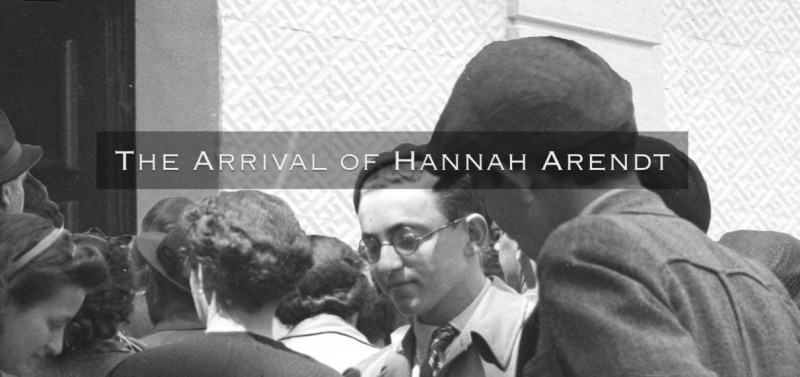
The Arrival of Hannah Arendt
This film describes the arrival of Hannah Arendt - a Jewish, German-American political theorist and publicist - in New York and her reflections on flight and helping people start over.

„Ich bin arm, mit Geld kann ich nicht helfen, aber ich möchte helfen mit dem, was ich kann, ausbilden möchte ich die Frauen, Kurse möchte ich geben, ohne Entgelt natürlich. Wenn ich doch nur einen geeigneten Raum hätte, denn in unser „Heim“ kann ich niemanden bitten. Helfen Sie mir, einen Raum zu finden, sagte ich zu der Sekretärin, ahnungslos, daß diese meinen Namen von drüben, wenn auch nicht mich persönlich, kannte.“ […]
Heute vor zwei Jahren sind wir hier angekommen. Trotz alles Schweren, allen Kämpfens um Existenz und Lebensraum ist der Rückblick „erfreulich“. Es geht aufwärts und wir haben uns. […]
Nach langen Verhandlungen habe ich heute den ersten Kurs für Frauen, die Krankenpflege erlernen wollen, begonnen. Die Organisation, bei der ich damals vorsprach, hat sich bereit erklärt, mir an einem oder zwei Abenden der Woche einen Raum in ihren heiligen Hallen zur Verfügung zu stellen, um dort die Frauen zu unterrichten -ohne Entgelt – natürlich, aber: sie haben eine Bedingung daran geknüpft. Ich soll dafür Mitglieder für sie werben. „Ich bin dazu herzlich ungeeignet, und ich übe niemals Zwang aus, aber, wenn Sie durch meine Kurse Mitglieder bekommen, so soll mich das freuen“, sagte ich kurz, und damit waren sie einverstanden. Ich bin froh, wie schon lange nicht mehr, denn nun kann ich doch zumindest in dieser Weise geben, etwas für Menschen tun, möge es zum Segen werden! […]
Ich gebe immer wieder Kurse, die Frauen sind so dankbar, und ich sorge, daß sie Arbeit bekommen. Meine „Stellenvermittlung“ wird bekannt, komisch, wie schnell sich in der Millionenstadt etwas herumspricht! Inzwischen haben sie mich gegen meinen Willen zur Präsidentin der sog. Frauengruppe gemacht. Alle meine früheren Schülerinnen haben darauf bestanden, daß ich es tue, und nun haben wir regelmäßige Zusammenkünfte mit musikalischen und anderen Vorträgen. Es sind ja so viele Menschen der Immigration hier, die glücklich sind, einmal wieder gehört zu werden, und ich gebe ihnen nun diese Möglichkeit, so weit ich kann.
“I am poor, I cannot help with money, but I would like to help with what I can, I would like to train the women, I would like to give courses, without payment of course. If only I had a suitable room, because in our “home” I can not ask anyone. Help me to find a room, I said to the secretary, unaware that she knew my name from over there, even if not me personally”. […]
Two years ago today we arrived here. Despite everything difficult, all the struggles for existence and living space, the review is “gratifying”. Things are looking up and we have each other. […]
After long negotiations, I started today the first course for women who want to learn nursing. The organization to which I applied at that time has agreed to provide me with a room in their sacred halls one or two evenings a week to teach the women there -without payment – of course, but: they have attached a condition to it. I have to recruit members for them in return. “I am cordially unfitted for this, and I never exert coercion, but, if you get members through my courses, that shall please me,” I said briefly, and with that they agreed. I am glad as I have not been for a long time, because now I can at least give in this way, do something for people, may it become a blessing! […]
I always give courses, the women are so grateful, and I make sure that they get work. My “job placement” becomes known, funny how quickly word gets around in the city of millions! In the meantime, they made me president of the so-called women’s group against my will. All my former students insisted that I do it, and now we have regular meetings with musical and other presentations. After all, there are so many people of immigration here who are happy to be heard again for once, and I now give them this opportunity as far as I can.
Hertha Nathorff, née Einstein (1895-1993) was a German pediatrician, psychotherapist and social worker, she published several works, including a book of poems. She was born in Laupheim (Baden-Württemberg) into a Jewish family. She was related to the physicist Albert Einstein, the musicologist and music critic Alfred Einstein, and the film producer Carl Laemmle. Nathorff attended high school in Ulm and, interrupted by a temporary job as a nurse during World War I, studied medicine in Munich, Heidelberg, Freiburg (Breisgau) and Berlin from 1914. After receiving her doctorate degree in Heidelberg (1920) and years as an assistant in Freiburg, she was a senior physician at the Red Cross Women’s and Children’s Home in Berlin-Lichtenberg from 1923-28, then worked in private practice and simultaneously at the Charlottenburg Hospital as head of the family and marriage counseling center. In the course of National Socialist racial policies, she lost her medical license in the fall of 1938, while her husband, formerly a senior hospital doctor in Berlin-Moabit, was granted a license for exclusively Jewish patients. During this period she worked as his receptionist.
Threatened with death in Nazi Germany, she organized emigration with the help of American relatives from November 1938, sending her 14-year-old son ahead to England on a Kindertransport. In April 1939 the couple managed to leave the country for London, and in early 1940 they continued their journey to New York. In New York, she worked as a nurse, maid, bar pianist and kitchen help – a very common fate among women with academic degrees in exile. Money and time were not enough to advance the recognition of one’s degrees. Women often took on the role of providing a living for the family. She remained a physician’s assistant in her husband’s practice, which opened in 1942 – she did not have the time and money to get her degree recognized.
Hertha Nathorff took a very active part in the social life of the German-speaking exile community: she organized courses for emigrants in nursing and infant care and cultural events, was the founder of the Open House for the elderly, chairwoman of the women’s group, and an honorary member of the presidium of the New World Club. In the excerpts from the diary of Hertha Nathorff Berlin-New York Aufzeichnungen 1933 bis 1945, which we show in our archive, the author deals with her initial problems, disappointments and mortifications in the New World. She reports on the everyday life of emigrants, on the struggle for existence, on poverty and mental destruction. Despite her longing for the places of her childhood and youth, she never visited Germany again. She never really settled in America. The homesickness remained constant.
Excerpt from the diary of Hertha Nathorff, edited and introduced by Wolfgang Benz (1987): Das Tagebuch der Hertha Nathorff. Berlin – New York. Aufzeichnungen 1933 bis 1945. Schriftenreihe der Vierteljahrshefte für Zeitgeschichte, Band 54. R. Oldenbourg Verlag München, pp. 105, 194-195, 200.
Translation from German to English © Minor Kontor / We Refugees Archive.